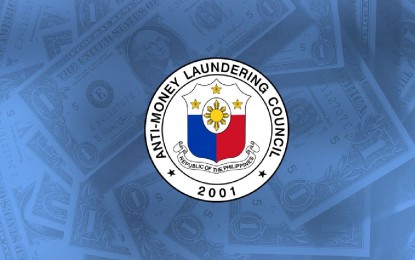
MANILA – An effective implementation of the Anti-Terrorism Act (ATA), not just simply instituting it, would keep the Philippines off the gray list of Paris-based anti-money laundering watchdog Financial Action Task Force (FATF).
In a reply to e-mailed queries from the Philippine News Agency (PNA), the Anti-Money Laundering Council (AMLC) Secretariat said the country should “demonstrate effective implementation of the Anti-Terror Act before the observation period ends in February 2021.”
During the virtual briefing on “Understanding the Human Rights Perspective of the Anti-Terrorism Act of 2020” last Sept. 3, AMLC executive director Mel Georgie Racela said 44 percent of all substantive sections in the ATA ensure human rights.
He said the law also addresses gaps in the country’s anti-money laundering and counter-terrorism financing (AML/CTF) system.
With the law's passage in July, the country could now implement tougher measures to combat terrorism even before the end of observation period on the effectiveness of the country’s AML/CTF.
The observation period was initially scheduled from October 2019 until October 2020, but it was extended until February 2021 because of the global pandemic.
According to the AMLC, among the ways to show the efficient implementation of the anti-terror law include having detailed timelines on identifying milestones on the convening of the Anti-Terrorism Council; the issuance of the Implementing Rules and Regulations (IRR); and the information dissemination to various stakeholders such as the law enforcement agencies and covered persons, including banks, insurance companies, entities supervised by the Securities and Exchange Commission (SEC) and the casinos.
Another way is the full and actual execution of Section 25, which discusses the designation of individuals, groups of persons, organizations, or association as terrorist based on the obligations under the United Nations Security Council Resolution (UNSCR) No. 1373, the AMLC Secretariat said.
Also needed is the “corresponding directive to file suspicious transaction reports and eventual freezing of their assets, if any, located in the Philippines", it said.
Being included in FATF’s gray list means a country has deficiencies on its financial system that makes it prone to risks on money laundering and terrorist financing.
The Philippines had been included in the gray list, and was even blacklisted, due to these deficiencies.
In 2000, the FATF blacklisted the Philippines based on its assessment that the country lacked the power to thwart money laundering and to pin down individuals involved in terrorist financing.
However, with the enactment of Republic Act 9160 or the Anti-Money Laundering Act of 2001 in September 2001, FATF elevated the Philippines to the gray list in June 2012.
The FATF then removed the Philippines from its watchlist in 2017 following the enactment of Republic Act 10927, which included casinos as among the covered institutions of the AMLC.
The AMLC has also proposed some amendments on the AMLA and it said that “failure to pass these amendments to the Anti-Money Laundering Act of 2001 (AMLA), as amended, and demonstrated it effective implementation will have similar effects, that is, inclusion in the Financial Action Task Force (FATF) International Co-operation Review Group (ICRG) gray list.”
“The AMLC has been very clear on this, during the Committee on Banks and Financial Intermediaries hearings chaired by Cong. Junie E. Cua. Thus, the AMLC remains optimistic that our competent authorities will deliver for the country and give the AMLC an opportunity to implement and to demonstrate positive and tangible progress,” it added.
The ATA was signed by President Rodrigo Duterte on July 3, 2020, giving the country more teeth to curb terror threats and acts. Government lawyers are still drafting the law's IRR which is expected to be out in a few months. (PNA)
